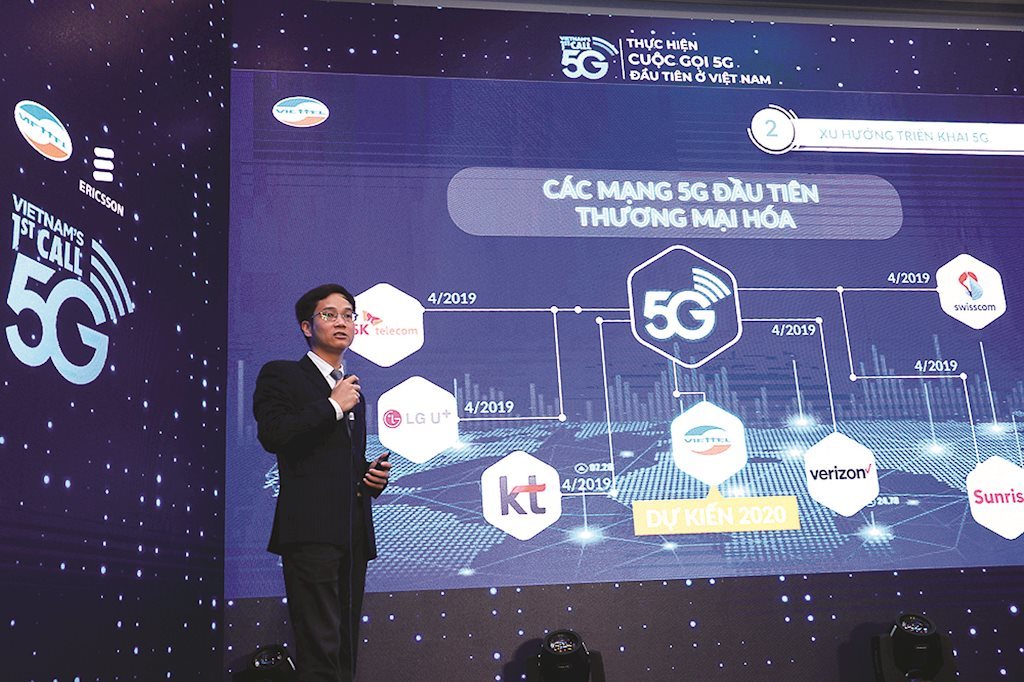
Vietnam was eight to 10 years slower than the world in deploying 3G and 4G. However, that has dramatically changed with 5G.
Minister of Information and Communication Nguyen Manh Hung stated that Vietnam will be among the first countries to deploy 5G, both in providing services and manufacturing 5G devices.
“Vietnam will commercialize 5G by 2020 with made-in-Vietnam equipment. Vietnam was behind other countries when utilizing 2G, 3G and 4G, but it will walk abreast in deploying 5G,” Hung said.
“Vietnam will commercialize 5G by 2020 with made-in-Vietnam equipment. Vietnam was behind other countries when utilizing 2G, 3G and 4G, but it will walk abreast in deploying 5G,” Hung said.
Of 131 mobile network operators which are deploying 5G, three are in Vietnam. There are still no standards and official frequency for 5G in the world. It is expected that standards will be set up in 2020.
2G technology is pure phone technology. 3G is half phone and half data. 4G is purely data, for human-to-human communication. Meanwhile, 5G is also data technology, but it is designed to connect everyone, with many new features and low latency.
While 2G, 3G and 4G are used to connect 7 billion people on Earth, 5G will connect trillions of devices and convey the entire physical world into the virtual world, and fundamentally change human life.
5G will increase the capacity and speed of broadband information, and make connections for everything (IoT), especially those that require real-time response; renovate industry, transportation, healthcare, agriculture and create smart cities; and create a new industry, the industry that produces trillions of devices, sensors, and triggering innovation in almost every industry.
Speaking at the ceremony where Viettel officially began trying 5G on May 10, 2019, Hung stressed that the trial of 5G in 2019 and commercial deployment in 2020 show that Vietnam won’t continue to be behind the world, but will be abreast with developed countries.
Viettel's 5G test must focus on finding out how to improve the quality of the network across the country.
One of the early applications of 5G is the smart factory, where new 5G technologies are being used. Viettel and other network operators should experiment soon to cover all high-tech parks, national innovation centers and smart factories by 2020.
While 2G, 3G and 4G are used to connect 7 billion people on Earth, 5G will connect trillions of devices and convey the entire physical world into the virtual world, and fundamentally change human life.
5G will increase the capacity and speed of broadband information, and make connections for everything (IoT), especially those that require real-time response; renovate industry, transportation, healthcare, agriculture and create smart cities; and create a new industry, the industry that produces trillions of devices, sensors, and triggering innovation in almost every industry.
Speaking at the ceremony where Viettel officially began trying 5G on May 10, 2019, Hung stressed that the trial of 5G in 2019 and commercial deployment in 2020 show that Vietnam won’t continue to be behind the world, but will be abreast with developed countries.
Viettel's 5G test must focus on finding out how to improve the quality of the network across the country.
One of the early applications of 5G is the smart factory, where new 5G technologies are being used. Viettel and other network operators should experiment soon to cover all high-tech parks, national innovation centers and smart factories by 2020.


